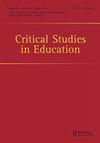Politics of rhythm and crisis in the slow death of higher education: implications for academic work and student support
IF 2.7
2区 教育学
Q1 EDUCATION & EDUCATIONAL RESEARCH
引用次数: 0
Abstract
This paper explores the role that conflicting rhythms of academic life and crisis have on the ability of academics to meet their commitments, such as providing support to students. Drawing from our experience in UK higher education, we argue that contemporary academic life can be seen as a constant process of being taken over by different crises. These crises tend to follow a rhythm of brief periods as emergencies subsequently operationalised into forms of ongoing, unresolved crisis. In turn, these crisis rhythms intersect with contrasting rhythms of different actors in university life, specifically that of academics, the institution itself, and students. Drawing from Lefebvre’s vocabulary of rhythmanalysis, we argue that the arrhythmia between these different groups in the university is a key part in the failure of higher education to do more than proliferate crisis. Illustrated by our experiences in student-support focused roles during the height of COVID-19 lockdowns, we explore how this particular crisis imposed itself as emergency but was then absorbed into the group of ongoing crises which impact on academic life. The paper concludes with suggestions of alternative approaches to university workload for staff and students alike, which might render university life more eurhythmic and equitable.高等教育缓慢死亡中的节奏和危机政治:对学术工作和学生支持的影响
本文探讨了学术生活和危机的冲突节奏对学者履行其承诺(如为学生提供支持)的能力的作用。根据我们在英国高等教育的经验,我们认为,当代学术生活可以被看作是一个不断被不同危机接管的过程。这些危机往往遵循一种短暂的节奏,因为紧急情况随后演变为持续的、未解决的危机。反过来,这些危机节奏与大学生活中不同角色的对比节奏相交,特别是学者,机构本身和学生的节奏。从列斐伏尔的节奏分析词汇中,我们认为大学中这些不同群体之间的心律失常是高等教育失败的关键部分,而不仅仅是扩散危机。根据我们在COVID-19封锁高峰期间以学生支持为重点的角色的经验,我们探讨了这场特殊的危机是如何作为紧急情况出现的,但随后被吸收到影响学术生活的持续危机中。最后,本文对大学工作人员和学生提出了一些替代方法,这些方法可能使大学生活更加有节奏和公平。
本文章由计算机程序翻译,如有差异,请以英文原文为准。
求助全文
约1分钟内获得全文
求助全文
来源期刊

Critical Studies in Education
EDUCATION & EDUCATIONAL RESEARCH-
CiteScore
10.10
自引率
5.10%
发文量
18
期刊介绍:
Critical Studies in Education is one of the few international journals devoted to a critical sociology of education, although it welcomes submissions with a critical stance that draw on other disciplines (e.g. philosophy, social geography, history) in order to understand ''the social''. Two interests frame the journal’s critical approach to research: (1) who benefits (and who does not) from current and historical social arrangements in education and, (2) from the standpoint of the least advantaged, what can be done about inequitable arrangements. Informed by this approach, articles published in the journal draw on post-structural, feminist, postcolonial and other critical orientations to critique education systems and to identify alternatives for education policy, practice and research.
 求助内容:
求助内容: 应助结果提醒方式:
应助结果提醒方式:


